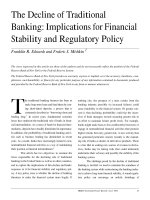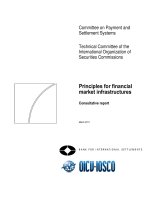Recommendation on Principles and Good Practices for Financial Education and Awareness potx
Bạn đang xem bản rút gọn của tài liệu. Xem và tải ngay bản đầy đủ của tài liệu tại đây (25.87 KB, 7 trang )
DIRECTORATE FOR FINANCIAL AND ENTERPRISE AFFAIRS
Recommendation on Principles and Good Practices for Financial
Education and Awareness
RECOMMENDATION OF THE COUNCIL
These Principles and Good Practices were adopted by the OECD Council.
July 2005
RECOMMENDATION ON PRINCIPLES AND GOOD PRACTICES FOR FINANCIAL
EDUCATION AND AWARENESS
THE COUNCIL,
Having regard to Article 5 b) of the Convention on the Organisation for Economic Co-operation and
Development of 14th December 1960;
Considering that, as financial education has always been important for consumers in helping them
budget and manage their income, save and invest efficiently, and avoid becoming victims of fraud;
Considering that as financial markets become increasingly sophisticated and households assume more
of the responsibility and risk for financial decisions, especially in the field of retirement savings,
financially educated individuals are necessary to ensure sufficient levels of investor and consumer
protection as well as the smooth functioning, not only of financial markets, but also of the economy.
Considering that surveys of financial literacy conducted in recent years in OECD countries show that
consumers have low levels of financial literacy and lack awareness of the need to be financially educated;
Considering that governments and relevant public and private institutions (at national and sub-
national level and including regulatory and supervisory bodies) in OECD and non-OECD countries may
benefit from international guidance on principles and good practices for financial education and awareness;
Considering that their implementation will have to take into consideration various economic, social,
demographic and cultural factors and, thus, will vary from country to country and that there are also
numerous methods to develop successfully financial education for a particular audience;
Considering also that the implementation of the good practices related to financial institutions needs
to take into consideration the diversity of financial institutions, that these guidelines do not prevent
relevant commercial activities and that national associations of financial institutions are expected to be the
main players for this sub-set of good practices;
On the proposal of the Committee of Financial Markets:
RECOMMENDS that Member countries promote financial education and awareness and in this
respect that governments and relevant public and private institutions take due account of and implement
the principles and good practices for financial education and awareness which are set out in the Annex to
this Recommendation and form an integral part thereof.
INVITES Member countries to disseminate these principles and good practices among public and
private (profit and not-for-profit) sector institutions that are involved in financial education and awareness.
INVITES Non-Member economies to take due account of this Recommendation and to disseminate
these principles and good practices among public and private (profit and not-for-profit) sector institutions
that are involved in financial education and awareness.
INVITES Member countries, through their work in the Committee on Financial Markets, the
Insurance Committee and its Working Party on Private Pensions, to identify further good practices
respectively in financial, insurance and pension education field.
INSTRUCTS the Committee on Financial Markets to exchange information on progress and
experiences with respect to the implementation of this Recommendation, review that information and
report to the Council within three years of its adoption, or sooner, and, as appropriate, thereafter.
ANNEX
PRINCIPLES AND GOOD PRACTICES
FOR FINANCIAL EDUCATION AND AWARENESS
I. PRINCIPLES
1. Financial education can be defined as “the process by which financial consumers/investors
improve their understanding of financial products, concepts and risks and, through
information, instruction and/or objective advice, develop the skills and confidence to become
more aware of financial risks and opportunities, to make informed choices, to know where to
go for help, and to take other effective actions to improve their financial well-being”.
Financial education thus goes beyond the provision of financial information and advice, which
should be regulated, as is already often the case, in particular for the protection of financial
clients (i.e. consumers in contractual relationships).
2. This financial capacity building, based on proper financial information and instruction, should
be promoted. Financial education should be provided in a fair and unbiased manner.
Programmes should be co-ordinated and developed with efficiency.
3. Financial education programmes should focus on high priority issues, which, depending on
national circumstances, may include important aspects of financial life planning such as basic
savings, private debt management or insurance as well as pre-requisites for financial
awareness such as elementary financial mathematics and economics. The awareness of future
retirees about the need to assess the financial adequacy of their current public or private
pensions schemes and to take appropriate action when needed should be encouraged.
4. Financial education should be taken into account in the regulatory and administrative
framework and considered as a tool to promote economic growth, confidence and stability,
together with regulation of financial institutions and consumer protection (including the
regulation of financial information and advice). The promotion of financial education should
not be substituted for financial regulation, which is essential to protect consumers (for
instance against fraud) and which financial education is expected to complement.
5. Appropriate measures should be taken when financial capacity is essential but deficiencies are
observed. Other policy tools to consider are consumer protection and financial institution
regulation. Without limiting the freedom to contract, default mechanisms, which take into
consideration inadequate financial education or passive/inert behaviour, should be considered.
6. The role of financial institutions in financial education should be promoted and become part of
their good governance with respect to their financial clients. Financial institutions’
accountability and responsibility should be encouraged not only in providing information and
advice on financial issues, but also in promoting financial awareness clients, especially for
long-term commitments and commitments which represent a substantial proportion of current
and future income.
7. Financial education programmes should be designed to meet the needs and the financial
literacy level of their target audience, as well as reflect how their target audience prefers to
receive financial information. Financial education should be regarded as a life-time, on-going
and continuous process, in particular in order to take account of the increased complexity of
markets, varying needs at different life stages, and increasingly complex information.
II. GOOD PRACTICES
A. Public action for financial education
8. National campaigns should be encouraged to raise awareness of the population about the need
to improve their understanding of financial risks and ways to protect against financial risks
through adequate savings, insurance and financial education
9. Financial education should start at school. People should be educated about financial matters
as early as possible in their lives.
10. Consideration should be given to making financial education a part of state welfare assistance
programmes.
11. Appropriate specialised structures (possibly embedded within existing authorities) in charge of
promoting and coordinating financial education should be encouraged at the national level
and regional and local public and private initiatives as close to the population as possible
should also be promoted.
12. Specific websites should be promoted to provide relevant, user-friendly financial information
to the public. Free information services should be developed. Warning systems by consumer,
professional or other organisation on high-risk issues that may be detrimental to the interests
of the financial consumers (including cases of fraud) should be promoted.
13. International co-operation on financial education should be promoted, including the use of the
OECD as an international forum to exchange information on recent national experiences in
financial education.
B. Role of financial institutions in financial education
14. Requirements to specify the types of information (including where to find information and the
provision of general comparative and objective information on the risks and returns of
different kinds of products) that financial institutions need to provide to clients on financial
products and services, should be encouraged.
15. Financial institutions should be encouraged to clearly distinguish between financial education
and financial information and “commercial” financial advice. Any financial advice for
business purposes should be transparent and disclose clearly any commercial nature where it
is also being promoted as a financial education initiative. For those financial services that
entail long-term commitment or have potentially significant financial consequences, financial
institutions should be encouraged to check that the information provided to their clients is read
and understood.
16. Financial institutions should be encouraged to provide information at several different levels
in order to best meet the needs of consumers. Small print, abstruse documentation should be
discouraged.
17. Financial education provided by financial institutions should be regularly assessed to ensure it
meets consumer needs. This may be achieved through partnerships with independent, not for
profit financial advisory bodies that may have better connection with consumers, particularly
those facing disadvantage in their participation in financial markets.
18. Financial institutions should be encouraged to train their staff on financial education and
develop codes of conduct for the provision of general advice about investment and borrowing,
not linked to the supply of a specific product.
C. Financial education for retirement savings
19. For individuals in private personal pension plans, the provision by financial institutions of the
appropriate financial information and education required for the management of their future
retirement savings and income should be promoted.
20. Concerning occupational schemes, (for which the related information and education should be
provided in a consistent way across the schemes) financial education and awareness of
employees and related policy tools should be further promoted, both for defined contributions
and defined benefits schemes.
D. Financial education programmes
21. Financial education programmes that help financial consumers find the facts and understand
the pros and cons as well as the risks of different types of financial products and services
should be promoted. Further research on behavioural economics should be promoted.
22. The development of methodologies to assess existing financial education programmes should
be promoted. Official recognition of financial education programmes which fulfil relevant
criteria should be considered.
23. Financial education programmes that develop guidelines on study content and
accomplishment level for each financial education programme and for each population sub-
group should be promoted.
24. In order to achieve a wider coverage and exposure, the use of all available media for the
dissemination of education messages should be promoted.
25. In order to take into account the diverse backgrounds of investors/consumers, financial
education that creates different programmes for specific sub-groups of investors/consumers
(i.e. young people, the less educated, disadvantaged groups) should be promoted. Financial
education should be related to the individual circumstance, through financial education
seminars and personalised financial counselling programmes.
26. For those programmes which favour use of classrooms, proper education and competence of
the educators should be promoted. In this respect, the development of programmes to “train
the trainers” and the provision of specific information material and tools for these trainers
should be encouraged.









